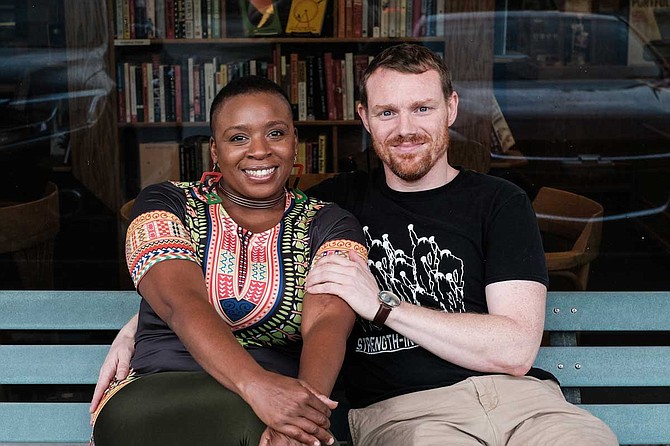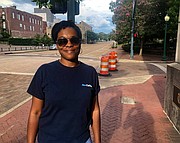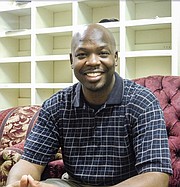Forrest County residents Anastassia Doctor and her husband, Dennis Harris, both say education is their top priority—and they want candidates to deal with the way race factors into the state’s educational woes. Photo by Ashton Pittman.
As Nikki Wallace and a friend walked along the sidewalk by The Clarion-Ledger building at 6 o'clock on the eve of the Fourth of July, she experienced fear that is a familiar part of the walk to her car after getting off of work in downtown Jackson. Someone was approaching from behind, and she could not see who it was, nor did she know whether the person meant her ill or simply intended to pass her by.
"I hope he's a good person," she thought to herself.
Wallace considered clutching her purse to her side, fearful the stranger might snatch it. "I don't want to offend them, though," she thought. Instead, she found a reason to acknowledge and look back at the stranger.
"I'm sorry if we're in your way," Wallace said, as she moved into a single file behind the male co-worker who was walking alongside her.
That's when I introduced myself.
"I'm a reporter for the Jackson Free Press," I told the pair. "I'm looking to talk to voters about the issues they care about in the upcoming statewide and local Jackson elections this year."
Wallace, relieved, quickly volunteered her own thoughts—starting with her concerns about violence and robbery in the city. In her north Jackson neighborhood, she often hears of homes and corner stores getting broken into and robbed, she said.
This year, Hinds County residents will elect a sheriff and a district attorney. To earn her vote, Wallace hopes those candidates will take a serious look at ways to reduce crime.
"I'm trying to keep faith here and spend money here, but they've got to do better," Wallace said.
Clinton resident Venetia Miller also told the Jackson Free Press that she would like to see more done to prevent crime in Hinds County, and she hopes candidates will consider more and better paid police officers as an option—a common refrain during campaign seasons in Mississippi.
"I'd like to see whoever is elected give some thought to the crime in this city," Miller said. And to attracting more police officers to the area by raising the salaries of those in law enforcement so that people would want to come here and be a part of law enforcement in the metro area." She also wants more jobs available for people so that "they don't feel a need to commit crime in order to make ends meet." Criminal-justice reform advocates, though, often warn that increasing policing and incarcerating more people can be counter-productive because criminals often leave prison committing worse and more violence offenses. Rather, organizations like fwd.us suggest taking steps to prevent crime in the first place.
Last year, Jackson Free Press editor Donna Ladd reported that two former criminals had begun training to help stop violence in Jackson with the help of a $150,000 grant. Former Simon City Royals leader Benny Ivey spent years in Mississippi prisons for crimes including aggravated assault and cooking meth, but made changes after getting out of prison in 2010 and going to rehab for drug addiction.
Another man, Terun Moore, served 17 years of a life sentence for killing a Detroit man during a robbery, but got out in 2017, thanks to a Supreme Court ruling that declared life sentences for minors unconstitutional. Last December, Ivey and Terun became Jackson's official and Mississippi's first "credible messengers."
The "credible messenger" approach to violence prevention trains former criminals so that they can use their knowledge and experiences to help young people avoid the same pitfalls they fell into. The approach, which is new to Mississippi but popular in cities around the country like Chicago, New York and Atlanta, rests on the idea that young people are more likely to listen to "credible" people like Ivey and Moore, rather than police or other officials to whom they cannot as easily relate.
"The 'credible messenger' approach can help prevent violence on the front end," Mayor Chokwe Lumumba said at a press conference announcing the initiative run by his sister Rukia Lumumba. "We have a police force that is working every day to respond to crime. But if we're only looking at crime as a matter of responding, then we are falling far behind the ball."
Miller said she hopes the next slate of city leaders will find ways to fund programs that would give youth more educational opportunities, in particular for those who "may not have support systems at home."
"Many students are not doing well in school because they don't have anyone at home to help them, and if our legislators would fund more after-school programs that are educational in nature, not just social, that would help our educational system in the metro area."
Violence prevention advocates cite education access as a key factor in preventing crime. A 2003 U.S. Department of Justice survey found that about 65 percent of all incarcerated citizens had not finished school to receive a high school diploma, and often came from poor neighborhoods where schools received less funding and educational opportunities were scant.
A 2016 BOTEC Analysis report on Jackson crime found that sending minors to jail or detention increased the likelihood of them committing worse crime later.
The Pothole Problem
Violence isn't the only thing dragging down Wallace's hopes in the city where she has lived 25 years. She said she no longer sees any point in upgrading her vehicle, thanks to the potholes that litter the city streets and make some neighborhoods difficult to drive through.
"We're spending outrageous money on tires. You used to get new tires just once a year, but now it's every few months," Wallace said.
Let's Talk Jackson Politics Podcast
Issues-focused election podcasts with Hinds County, legislative and statewide candidates focusing on substance over partisan horse-race politics.
Making Jackson's roads better, though, would require more funds, which could mean higher taxes. When Jackson Free Press city intern Aliyah Veal reported on the pothole issue last month, one resident of Brookleigh Hills who deals with potholes every day said he would be glad to pay more if that is what it takes.
"If you don't have enough tax dollars, then you adjust that," he said. "You raise city taxes. If you figure that's what it takes to get the job done and keep things repaired, that's what you do."
Potholes have led to a number of incidents in the city: a Jackson Public School bus got stuck in a pothole in May; Marie Jones died after hitting a pothole, losing control of her car and striking a pole on Terry Road in 2017; high school senior Frances Fortner died after her car flipped over an uncovered manhole on Ridgewood Road—an uncovered manhole residents had already filed multiple complaints about. The city lodged 2,028 complaints about potholes last year alone.
Typically, though, Jackson City Council members oversee and deal with city infrastructure issues, but voters will not have a chance to weigh in on their job performance until 2021. But all statewide offices and legislative races on the ballot this year, and Wallace said she wants candidates vying for jobs like governor and the Mississippi Senate to do something to help the capital city.
"They live in nice homes and drive nice cars and don't care what's happening to other people and don't care what's going on," she said. "I think they should be involved."
While she is trying to hold onto Jackson, Wallace said is seriously thinking about moving to Raymond—a rural town about 35 minutes west where she attends church on Sundays.
"It's such a nice place. ... You never hit a pothole, and if you see one, someone is coming out to fix it. So it just feels like home, versus here," Wallace said.
Better Pay, More Resources
In Sumrall, another small country town just under two hours southeast of Jackson, Tabetha Baker has her own set of issues she hopes this year's slate of candidates will address.
As a young girl, she watched her mother, a special-education teacher, struggle with the demands of the job and the low pay that came with it.
"I will never do that job," Baker thought to herself.
In college, she studied to become an English teacher. But after her daughter was born premature, things changed. Along with the struggles that face children born too early in a pregnancy, her daughter developed dyslexia and ADHD.
"I got on the other side of what parents go through when they fight for their children," she told the Jackson Free Press at a Lamar County teachers' town hall with Mississippi Rep. Jay Hughes, a candidate for lieutenant governor whose unofficial slogan is, "It All Starts With Education." Hughes wants higher teacher pay, more money for schools and an end to programs that shift funds to private schools through voucher programs.
Baker's baby girl, with all of her struggles, convinced her that she was meant to follow in her mother's footsteps as a special-education teacher, with all the pitfalls that come with it.
The job comes with moments of joy, Baker said. At the end of one school year, a student with autism told her something she will never forget as he was bidding her farewell.
"He said, 'Mrs. Baker, I felt safe with you,'" she recalled. "That's the highest compliment a child with autism can give."
While she holds onto such moments and firmly believes she "couldn't be anything other than a special-education teacher," Baker struggles with the job's demands and low pay. Because of the nature of her student's disabilities, she spends around 15 hours outside her class each week. Instead of hiring extra staff, schools shift the duties required to comply with legal concerns onto teachers.
Despite the extra workload, Baker said, she is paid the same as any other teacher. This year, though, after the Legislature passed the first teacher pay raise in five years, she and other special-education teachers did not get it, thanks to a technical error. Fortunately for her, the Lamar County School District is one of the better funded in the state, and decided to pick up the tab for the $1,500 pay boost until state leaders sort out the issue. Even so, she said, the pay boost just is not enough.
"Thank you for the $1,500, but I think it's grossly undervaluing" the work teachers do, Baker said, pointing out that educators can leave Mississippi, go one state over in any direction (except south, of course), and earn anywhere from $6,000 to $10,000 more in yearly salaries for the same job. "How do you put a number on the most invaluable thing you could give a person?" Baker asked.
A poll that Millsaps College, in collaboration with Chism Strategies, released on July 9 revealed that nearly 70 percent of Mississippians support raising teacher pay and think the $1,500 raise was too small. A plurality of Mississippians cited funding public education as their top issue. In past surveys, funding for roads and bridges topped the list; this time, it fell to second.
'What Is Your Black Agenda?'
At T-Bones' Record Store and Cafe in Forrest County, Anastassia Doctor and her husband, Dennis Harris, both leapt to answer when the Jackson Free Press asked them what their top issue is for Mississippi in this year's elections.
"School," Doctor said. "Education," Harris offered at the same time.
Doctor and Harris have been together for seven years and are raising two daughters. Doctor is an African American woman with short hair and deep brown eyes who, on that day, wore a top with traditional African stylings and a pair of red, black and green earrings. Harris, on the other hand, is a white man with blue eyes and reddish-brown hair. He wore a black t-shirt depicting a crowd of people with fists raised and the words, "Strength-in-Numbers" beneath them.
When it comes to the issues, Harris said, he listens carefully to Doctor and other black women; they are more acutely aware of the issues, he said, because they face more headwinds than white men like himself.
Doctor agrees that public-school teachers in the state deserve a pay raise.
"Mississippi is 49th in education, and we still have segregated schools," she said. "My kids' school is right there, and it's 95 percent black," she said, referring to the school not far from the record store. "And just as (Forrest County Democratic candidate for State House) Brandon Rue said, there is not a majority-black school that is A-rated in Mississippi, and there is not a majority-white school that is rated as failing. So where's the discrepancy come from; where's it at?"
Race is at the heart of the state's education issues, and she wants candidates to take that into account.
"If we don't focus on education and paying our teachers, our most vulnerable, which is minorities and black children, are the ones that are going to keep the brunt of this racism that we've got going on," Doctor said.
In April, Doctor attended a town-hall meeting that featured Rue and Democratic Attorney General Jim Hood, who is running for governor. There, she challenged him.
"What is your black agenda?" she asked the middle-aged white Democrat, who is the only member of his party who still holds statewide office.
Hood responded by talking about his efforts at fostering a diverse workplace in the attorney general's office, and pointed to his prosecution of one of the men involved in the infamous "Mississippi Burning" murders in 1963 Philadelphia, Miss.
Doctor was not asking about diversity, though; she wanted to know about his plans to address the specific needs of black Mississippians.
"As black voters, we've been shown benign neglect over and over again," Doctor told Hood, also criticizing him for what she considered a poor response to questions about old yearbook photos showing members of Hood's fraternity wearing blackface. Hood said he never took part in any events like that and was not in any of the photos. Then, he made a joke about hunting.
"When I go hunting, I don't even like to wear a mask," he told reporters when the photos first surfaced in February, saying masks make him uncomfortable, and that face paint would, too. Photos also surfaced early this year showing members of Lt. Gov. Tate Reeves' fraternity in blackface. He is a Republican candidate for governor, and would face Hood in the general election if both win their respective party primaries in August.
Struggling to Make Ends Meet
Education is on Hattiesburg bartender Jordan Farrar's mind, too. He is a full-time bartender at The Porter Public House in the city's downtown, and he also bartends part-time at a restaurant up the road, near the University of Southern Mississippi. Last fall, he was also a student at USM where he studied art and graphic design, but had to drop out midway through the semester for personal reasons.
On July 2, Farrar said he is ready to return, but has been put off by the arrival of student-loan bills, which start going out either within six months of students graduating or within six months of them taking time off from school. Already, he is $18,000 in debt, and the school keeps raising tuition rates, even though they are shortening their semesters.
"That doesn't make sense to me," he said. "I feel like I'm paying more for less and not getting a full education. It's become harder the older I get to find time to make money for it."
Part of the problem, Farrar said, is that he has been trying to study at his own pace, rather than follow a rigorous full-time college schedule, in order to balance work life and school life.
"Does that make me a bad student?" he said. "I don't think so. I just have other things going on in my life. ... The schools aren't making it easy for people to continue their education."
While he thinks USM's art program is "amazing," he has watched other students struggle with the cost of college and even drop out. One classmate, he said, dropped her classes several weeks into the school year because she owed the university about $4,000 and could not continue until she caught up.
"You're going to tell this girl that she can't finish school, when that degree would put her in a different tax bracket where she could make the $4,000 she needs to pay it?" Farrar said incredulously.
Despite working full-time and then some, Farrar said he still sits near the federal poverty level—a consequence of his desire to leave his parents' home, get his own place, and care for himself.
"You have to choose between whether you want personal growth and to feel like an adult, or whether you wanted to bide your time and wait," Farrar said. "And I guess I just got impatient."
While he's ready to return to college and finish earning his degree, Farrar said he is not optimistic about his prospects.
"How can I even think about the future when the present is so dire?" he said.
Marijuana, Medicaid and Abortion
One of Farrar's bar patrons, Candice Hyden, works for a loan company. She told the Jackson Free Press that she also hopes statewide candidates will look for ways to help alleviate the economic struggles of Mississippians.
"How can we help one another?" Is what voters and candidates should ask, she said. She has one answer: Legalize medical marijuana. It could help people with certain illnesses and bring new economic opportunities to the state, she said.
"We don't have a lot of economy, but we do have a lot of land. ... It could help, not just people with ailments, but who need work," she said.
Just one street over is the office for the Medical Marijuana 2020 campaign, which aims to get that issue on the ballot for Mississippi voters to decide in 2020. Candidates have been reluctant to discuss the issue, though, with State Rep. Robert Foster, a Republican candidate for governor, saying he would defer to the judgment of voters in a January interview .
Jackson resident Torey Phillips told the Jackson Free Press that one of his top concerns is improving the state's health-care system and making it easier for people to access health care. Mississippi ranks at the bottom when it comes to health-care coverage and outcomes.
Several candidates for governor have offered proposals to expand the state's Medicaid program, including Attorney General Hood, the top Democratic contender, and Republican candidates for governor State Rep. Robert Foster and former Mississippi Supreme Court Justice Bill Waller. Lt. Gov. Tate Reeves, the top Republican candidate for governor, though, has repeatedly come out against expanding Medicaid, which would require the state to accept billions in federal dollars under President Obama's 2010 Affordable Care Act.
"I am opposed to Obamacare expansion in Mississippi. I am opposed to Obamacare expansion in Mississippi. I am opposed to Obamacare expansion in Mississippi," Reeves chanted to members of the press when asked about the idea in January.
So far, Reeves has spent much of the campaign focused, instead, on promoting Mississippi's six-week abortion ban, which he oversaw passage of as president of the State Senate in March.
At a protest outside the Mississippi Capitol against the ban in May, though, Clinton resident Joedda Gore, who attended the rally with her mother, criticized conservative politicians for "manipulation of the abortion issue." She said she wished they would focus on improving the state's infant mortality rate, which is among the highest in the nation.
"Here's this red flag in front of the bull—abortion, abortion," she said. "No, the issue is, the babies are being born, but they die before they are 2 years old. Why can't we help the born? I think abortion is a shiny object. It gets a lot of votes, but it's not our issue. Our issue is that we let babies get born, and then they die."
Joshua Wright and Aliyah Veal contributed to this report. Follow State Reporter Ashton Pittman on Twitter @ashtonpittman. Send tips to [email protected].
More like this story
More stories by this author
- Governor Attempts to Ban Mississippi Abortions, Citing Need to Preserve PPE
- Rep. Palazzo: Rural Hospitals ‘On Brink’ of ‘Collapse,’ Need Relief Amid Pandemic
- Two Mississippi Congressmen Skip Vote on COVID-19 Emergency Response Bill
- 'Do Not Go to Church': Three Forrest County Coronavirus Cases Bring Warnings
- 'An Abortion Desert': Mississippi Women May Feel Effect of Louisiana Case









Comments
Use the comment form below to begin a discussion about this content.
comments powered by Disqus